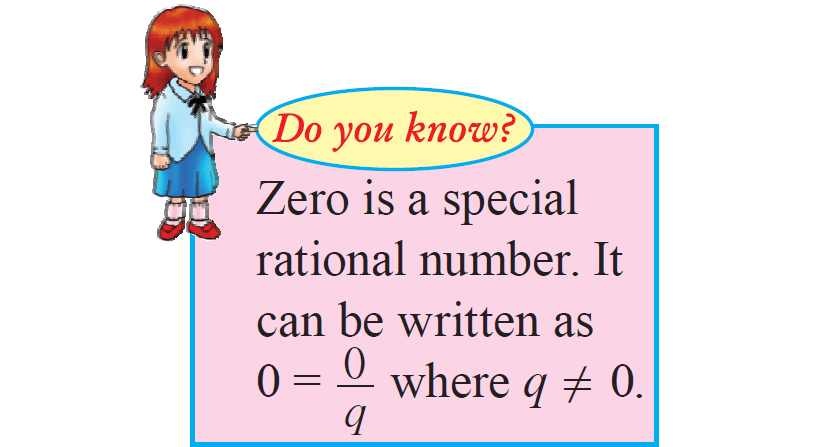PROPERTIES OF MULTIPLICATION OF RATIONAL NUMBERS
Subscribe to our ▶️ YouTube channel 🔴 for the latest videos, updates, and tips.
There are some properties of multiplying rational numbers like closure, commutative, associative, identity and distributive.
Closure Property
The product of two rational numbers is always a rational number. Hence Q is closed under multiplication.
If a/b and c/d are any two rational numbers,
then (a/b)x (c/d) = ac/bd is also a rational number.
Example :
5/9 x 2/9 = 10/81 is a rational number.
Commutative Property
Multiplication of rational numbers is commutative.
If a/b and c/d are any two rational numbers,
then (a/b)x (c/d) = (c/d)x(a/b).
5/9 x 2/9 = 10/81
2/9 x 5/9 = 10/81
Hence, 5/9 x 2/9 = 2/9 x 5/9
Therefore, Commutative property is true for multiplication.
Associative Property
Multiplication of rational numbers is associative.
If a/b, c/d and e/f are any three rational numbers,
then a/b x (c/d x e/f) = (a/b x c/d) x e/f
Example :
2/9 x (4/9 x 1/9) = 2/9 x 4/81 = 8/729
(2/9 x 4/9) x 1/9 = 8/81 x 1/9 = 8/729
Hence, 2/9 x (4/9 x 1/9) = (2/9 x 4/9) x 1/9
Therefore, Associative property is true for multiplication.
Multiplicative Identity
The product of any rational number and 1 is the rational number itself. ‘One’ is the multiplicative identity for rational numbers.
If a/b is any rational number,
then a/b x 1 = 1 x a/b = a/b
Example :
5/7 x 1 = 1x 5/7 = 5/7

Distributive Property
(i) Distributive Property of Multiplication over Addition :
Multiplication of rational numbers is distributive over addition.
If a/b, c/d and e/f are any three rational numbers,
then a/b x (c/d + e/f) = a/b x c/d + a/b x e/f
Example :
1/3 x (2/5 + 1/5) = 1/3 x 3/5 = 1/5
1/3 x (2/5 + 1/5) = 1/3 x 2/5 + 1/3 x 1/5 = (2 + 1) / 15 = 1/5
Hence, 1/3 x (2/5 + 1/5) = 1/3 x 2/5 + 1/3 x 1/5
Therefore, Multiplication is distributive over addition.
(ii) Distributive Property of Multiplication over Subtraction :
Multiplication of rational numbers is distributive over subtraction.
If a/b, c/d and e/f are any three rational numbers,
then a/b x (c/d - e/f) = a/b x c/d - a/b x e/f
Example :
1/3 x (2/5 - 1/5) = 1/3 x 1/5 = 1/15
1/3 x (2/5 - 1/5) = 1/3 x 2/5 - 1/3 x 1/5 = (2 - 1)/15 = 1/15
Hence, 1/3 x (2/5 - 1/5) = 1/3 x 2/5 - 1/3 x 1/5
Therefore, Multiplication is distributive over subtraction.
Subscribe to our ▶️ YouTube channel 🔴 for the latest videos, updates, and tips.
Kindly mail your feedback to v4formath@gmail.com
We always appreciate your feedback.
About Us | Contact Us | Privacy Policy
©All rights reserved. onlinemath4all.com

Recent Articles
-
Digital SAT Math Problems and Solutions (Part - 39)
Mar 03, 26 04:59 PM
Digital SAT Math Problems and Solutions (Part - 39) -
Digital SAT Math Problems and Solutions (Part - 38)
Mar 03, 26 10:05 AM
Digital SAT Math Problems and Solutions (Part - 38) -
Solving Problems on Percentage
Mar 03, 26 04:54 AM
Solving Problems on Percentage

